Whether you’re thinking about starting a blog for the first time or you’re working hard to grow your existing audience—it’s expected to wonder if you have what it takes to make your own blogging business work. Do you have the right blogging skills to capture readers’ attention, promote your content, and make money blogging? These are all good questions to ask.
Thankfully, I have good news for you. There are almost certainly some blogging skills you already command—that initially sparked your interest in blogging in the first place. Maybe you’re naturally skilled at writing; you have a knack for marketing or an affinity for building relationships. The best part, though, is that you can develop all of the other necessary blogging skills you’ll need to succeed. You need to know where to focus your learning efforts.
16 Blogging Skills You’ll Need in 2024: Top Skills for Bloggers
- Curiosity
- Prioritization
- Discipline
- Writing
- Marketing
- Relationship Building (Networking)
- Patience
- WordPress Management
- Basic Knowledge of HTML
- Understanding SEO
- Finding and Learning From Your Audience
- Researching
- Financial Management
- Understanding Analytics
- Flexibility
- Humility
Disclosure: Please note that some of the links below are affiliate links, and at no additional cost to you, I’ll earn a commission. Know that I only recommend products and services I’ve personally used and stand behind. When you use one of my affiliate links, the company compensates me, which helps me run this blog and keep all of my in-depth content free of charge for readers (like you).
Ready to Start Your Blog (the Right Way)?
Check out my ultimate guide How to Start a Blog (on the Side) Today.
I’ve been blogging for over a decade, and my experience has taught me which blogging skills are most pertinent to becoming a better blogger. While this is not an exhaustive list of every skill a blogger can have, it includes my picks for the most fundamental, crucial blogging skills you’ll need to command to become a successful blogger.
Now, let’s dive in and break down the most important blogging skills you’ll want to build (and strengthen) this year.
Blogging Skills #1: Curiosity
One of the first (arguably most important) blogging skills that’ll benefit anyone considering a blog as a long-term endeavor is developing an intense curiosity—particularly about the niche you’re blogging about.

A natural curiosity for the things you’re writing about (or soon will be) will help you stay focused even while the hours are long and the rewards are few in the early days of your blog. Without this in your stable of blogging skills, you’ll have difficulty gaining momentum and pushing through the tough times ahead.
Why? Because moments of motivation aren’t enough to sustain the long-term investment it’ll take to reach meaningful growth with your blog. It takes time to figure out your target audience, identify the tactics that can successfully reach them, build up momentum, and find win-win ways to monetize your blog with your audience’s best interests in mind. An eager curiosity to learn more, share more, and better help your audience is essential among the blogging skills you’ll want to develop for yourself.
So, what’s one way to help keep up your curiosity with your blog audience? Pick a clear niche that you feel excited about spending time exploring for the foreseeable future.
Ideally, you should be able to choose a blog niche that meets these two criteria (to help keep your curiosity alive):
- In a topic area, you have a good amount of experience with
- It is interesting enough to keep you engaged for months (and years) to come
If you truly enjoy the subject you’re blogging about, then your level of curiosity should be sustainable over time. Without that internal drive to continue learning & serving, it’ll be much more challenging to secure the success of your blog over the long haul.
Blogging Skills #2: Prioritization
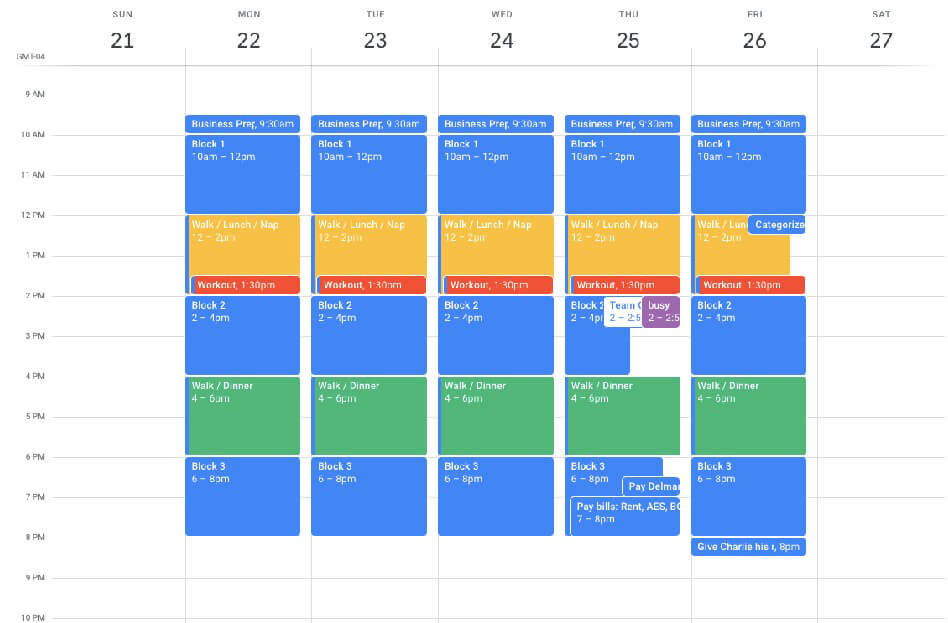
I’ve seen this happen time and time again with bloggers. They’ve found their niche, they’re passionate about helping people, and they’re pumped to start generating revenue from their blogs. They get the right hosting plan, start using WordPress, and publish their first few blog posts.
Then reality sets in, and things go quiet…
They’re still working full-time, and they may have a spouse and kids at home. Then, it dawns on them that time to work on their blog is precious and rare. They haphazardly write a blog post here and there without it feeling like their best work. There’s no time to promote it, so income doesn’t come in yet. The blog soon becomes their lowest priority (because there’s little instant gratification), and it dies a quiet death.
Progress will be plodding if you don’t create the time and space within your schedule to devote focused time to your blog. This is one of the top blogging mistakes that leads to giving up on your blog too soon, even when there’s so much potential for future growth.
The solution? Prioritize real-time blocks within your day, week, and month to work on your blog. Take the Google Calendar screenshot above as an example of how I structure my schedule into blocks of time throughout the day—each with its purpose and focused activity I’ll be working on. The same practice can be applied to scheduling your “blog time” around other blocks of commitments in your life.
It doesn’t mean taking time away from important things like family or your full-time job (yet), but developing prioritization as one of your blogging skills does mean intentionally carving out time to work on your blog. It may mean making sacrifices like watching less Netflix in the evenings, getting up a little earlier in the morning, or forgoing a little time with friends and family on weekends.
Bloggers who can intentionally schedule blocks of time during the day (or week) see the fruits of their labor much sooner than those working with an unorganized schedule.
Blogging Skills #3: Discipline
Discipline is another one of those character traits (and blogging skills) that truly can’t be overhyped in its importance to blogging. This blogging skill works hand-in-hand with both curiosity and prioritization, too.

Without discipline, you may have your blog working time scheduled, but you won’t be able to stick to your agenda. All the planning in the world can’t keep you on the right track if you don’t adhere to the commitments you’ve made to grow your blog—which means logging out of Facebook, avoiding distractions on your phone, and not allowing yourself to get sidetracked by other impulses (or requests on your time). If you’re struggling with content planning efforts, grab my free blog planner bundle and turn things up a notch today.
If self-discipline isn’t your strength right now, fear not—it’s one of the blogging skills that can be improved greatly. Here are a few things you can do:
- Make small changes: If the many components of blogging seem overwhelming, focus on a few small things you can work on at a time. Start by writing just one blog post a week (or one every two weeks) using SEO best practices. Once you have mastered that, you can add other important parts of blogging, like creating landing pages, launching an email newsletter, and others.
- Find joy in your work: It’s much easier to be disciplined with something you care about and enjoy. This largely goes back to picking the right niche for your blog. If it’s something you’re interested in, there’s a much better chance you’ll be able to stay disciplined in your work.
- Don’t be goal-focused only (use smart habits instead): My friend James Clear wrote a trendy book, Atomic Habits, about this exact subject, in which he describes how changes in seemingly small habits can help people become significantly more productive. He makes a compelling case for loving the process that leads to a goal—rather than only focusing on achieving it. Here’s how he describes it. When you fall in love with the process rather than the product, you don’t have to wait to permit yourself to be happy. You can be satisfied anytime your system is running. A system can be successful in many different forms, not just the one you first envision.
For even more ideas about how to develop your blogging skills when it comes to discipline, I have my own book, The Habits of Highly Successful Bloggers, which goes even deeper into developing your own actionable ways to become more disciplined with your blog.
Blogging Skills #4: Writing

I know it seems obvious that writing is one of the top blogging skills you’ll need to be proficient in at least some degree, but don’t let it intimidate you.
Commanding even the basics will take you a long way! You don’t need to be a trained writer, professional journalist, or seasoned copywriter to be successful with a blog.
I wasn’t a great writer when I first started my blog here. Over time, though, I leaned into my marketing strengths to drive some early readers and results to my blog. Doing that motivated me to invest in building my writing abilities. With much writing practice (and reading of authors I admire), I gradually became more confident in my writing skills and personal voice.
Internet Writing (Blogging Skills)
Bloggers need to develop writing skills. Some people are exceptional writers when it comes to academic papers or physical books, but this doesn’t always translate to successful Internet writing.
Remember to make your content very easy to read when you write on the Internet. Most people doing a quick Google search are not looking for something overly complicated. Large walls of text are also difficult to scan (and off-putting) for someone looking to get a specific answer to a question they have—which also makes your blog layout crucial.
To make writing more Internet-friendly, take these best practices into account:
- Utilize a lot of headers and sub-headers to break up your ideas
- Distill large paragraphs into smaller paragraphs for easier readability
- Use images, graphs, and videos to make your writing more visually interesting (and break up text)
- Leverage formatting features like bullet lists, block quotes, and section dividers to encourage readers onward
Here’s an example from my breakdown of the best eCommerce website builders. You can see how I organize my content for Internet-friendly reading.
First, I have a short introduction to the piece, setting the stage for my article. Next, I have the piece’s title followed by an easily navigable table of contents. The table of contents allows readers to jump right to the section they’re interested in if they already have a specific question.
You can also see a sidebar menu that scrolls along with the article (on desktop), in case someone wants to find a new section quickly:
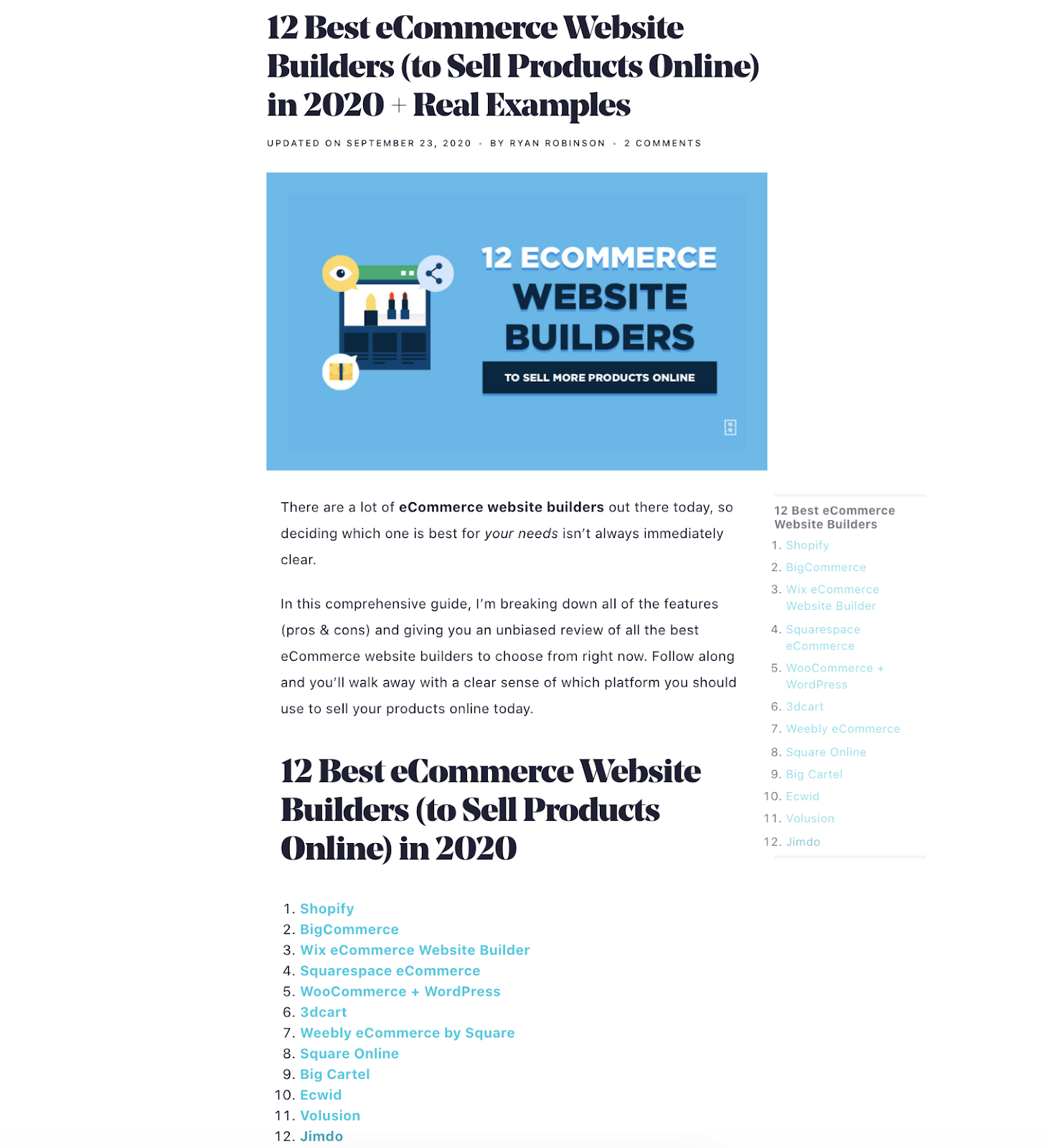
In the article’s next section, I include several collapsible drop-down tabs. This was information that I felt would be helpful to many readers but may distract from the core idea of the article, so those who want to opt-in to reading those Q&As could choose to do so—or they can move past it quickly to get to my reviews of eCommerce website builders:
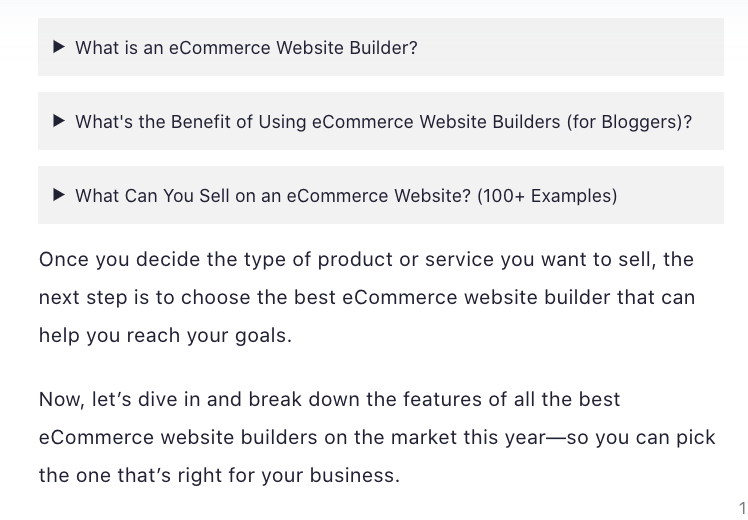
Here’s a section where I discuss one of the website builders, WooCommerce. Throughout, you can see that I use headers, screenshots, and bullet points to make the piece visually interesting—and to keep the text from becoming overwhelming to my readers:
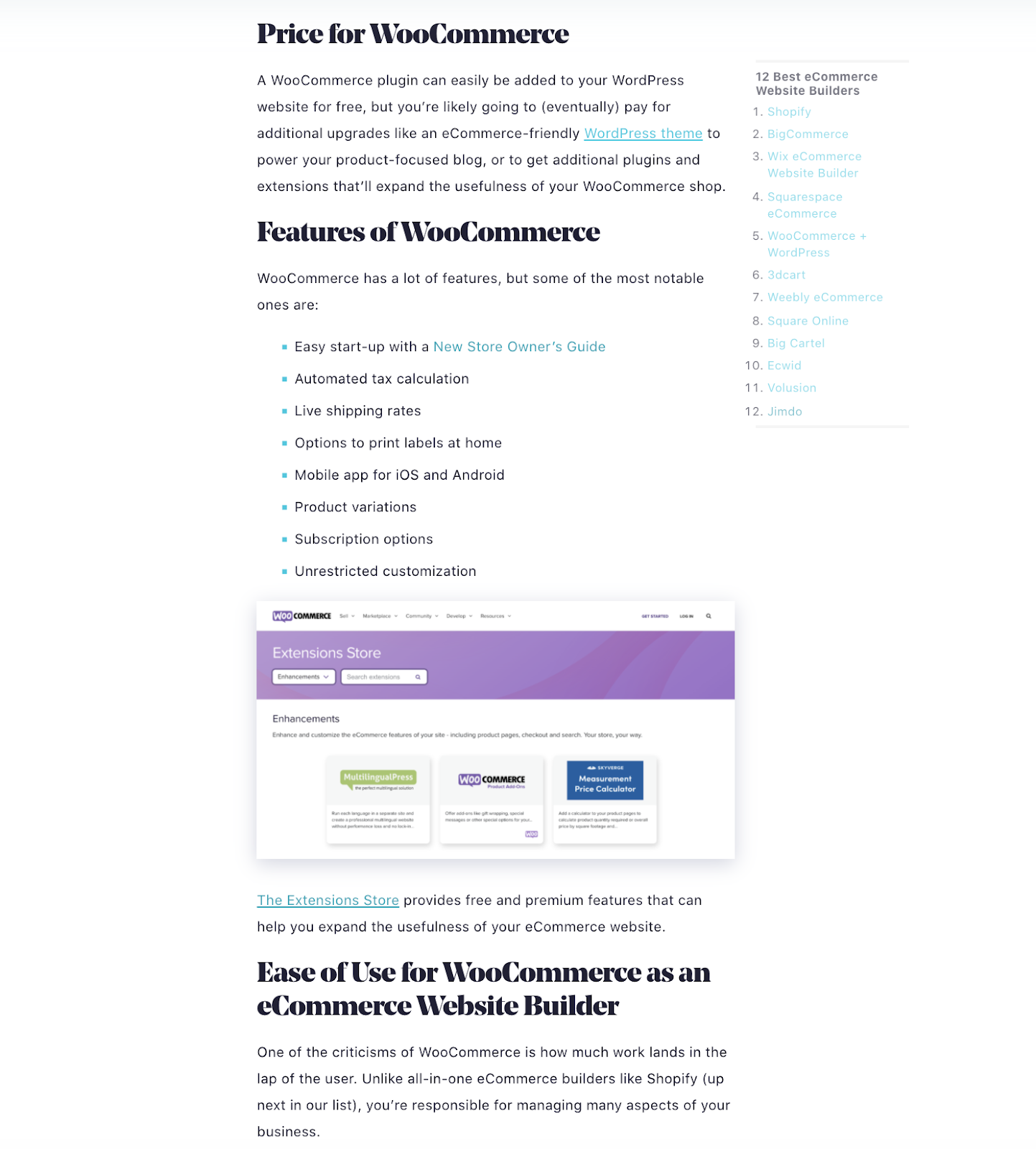
Depending upon the kinds of topics you’re covering with your blog, there are some formatting features you may choose to forego (and that’s ok). Keep in mind that Internet readers have short attention spans—and a large part of serving your audience is giving them the answers they seek in the quickest, most valuable package. Either way, writing for the Internet is one of the blogging skills we can always perfect.
Blogging Skills #5: Marketing
Some people are naturally skilled marketers; others must learn how to promote their blogs from scratch. I’m fortunate that I worked in content marketing for several years before starting my blog here, so I had many opportunities to build this blogging skill—and I’m living proof that marketing is a skill that can be learned.

Marketing skills are beneficial to bloggers, but there isn’t a rigid manual that you should follow. The blogging skill of marketing often comes down to experimenting with different growth tactics and seeing what works best for your unique blog (and audience). What works for one blogger or particular niche may not work (the same) for everyone else out there.
You may think that if you’re presenting something good enough to the world, it will immediately go viral. While some lucky few are instant internet sensations, that’s not the story for most bloggers. Most bloggers will tell you they must work hard to get eyes on their content and grow loyal followers. This is the case even if you have great content.
I’ll lay out some of my best blog marketing ideas here to give you somewhere to get started. These concepts are a great launching point if you’re not sure how to start marketing your content, but remember that it’ll take relentless experimentation to crack the code to drive an audience to your blog:
- Learn how to use social media: Social media is an incredible way to connect with other people. You can use it to network, promote your content, and learn more about your niche. One of the best things you can do when using social media is to choose one or two platforms that you’re familiar with that match your style and niche. Choosing the right platform and focusing on it will help you stay focused and reach the most significant number of people.
- Make a nice layout for your blog: Part of marketing your blog means having something marketable. If your blog looks clean, professional, and attractive, you’ll likely get shares and repeat visitors. For more ideas about making your blog look amazing, check out my guide, which covers blog layout examples.
- Have a basic understanding of SEO: I’ll go into this in greater detail below, but search engine optimization is one of the most excellent tools you can put in your toolbox for blog marketing. When social media posts fall by the wayside, you can still drive traffic through organic searches.
- Network in your niche: Later in this guide, I’ll discuss the blogging skill of networking, but it’s also worth mentioning here. Networking is key to getting the right people to see your blog and help promote your content.
- Make it easy to share your content: Don’t make it hard for your visitors to share your work with others. Include social media share buttons on your blog, encourage people to share your work, and make content worth sharing.
- Try out guest blogging: In my career as a blogger, guest blogging has been an integral part of my blog business plan. Not only is this a great way to network, but it also helps drive traffic and boosts my SEO ranking.
- Include email in your marketing plan: You’ll often hear bloggers say that you can never start too early with email marketing, and it’s true. Start by choosing a smart email marketing tool and begin collecting email subscribers. As you grow your email list, you can try out different email styles to see which ones drive the most traffic to your blog.
- Use great blogging tools to market your blog: Many blogging tools are available to help you along the way.
- Learn how to differentiate your blog from your competition: You’re likely not the first person blogging in your niche—and that’s a good thing. If you want to learn the best way to market your blog content, see what the competition is doing. If it’s working for them, it might work for you. Understanding the competition also allows you to try out new ideas. You may be able to come onto the scene with a completely fresh outlook that readers will love.
Again, I can’t stress enough that marketing is one of the blogging skills that your blog will continually build, test, and strengthen over time. There’s no simple code to be cracked where you’ll instantly unlock thousands of readers, but if you invest enough time into experimenting with how to bring readers to your blog, you’ll start to learn what works—and you can double down on those strategies.
Blogging Skills #6: Relationship Building (Networking)
One blogging skill that may not immediately come to mind when considering your blog is networking. Blogging by nature often feels exclusive, but building a community and learning from those who’ve already come before you are key aspects of growing your blog.

Many of the world’s top bloggers mentioned networking as a top skill to develop in my roundup of actionable blogging advice, but finding win-win ways to partner with other people in your niche (or related fields) has been essential to growing my audience and personal brand over the years.
Here are some of the best ways I’ve found to grow your blog through relationship-building and networking:
- Speak at conferences and offer expert advice: If you’ve started a blog based on your experiences, there’s a good chance you have something to teach others. Speaking at a conference and directing the audience to your blog is a great way to network in your niche.
- Guest speak on a podcast: Podcasts are top-rated. People listen to them on their commute to work or when cleaning the house. Hopping on as a guest on a popular podcast can help you reach a much wider audience.
- Join online communities in your niche: If you can find communities, you can find people to network with online. Some good places to look are niche-focused forums, message boards, social media groups, and other social networks.
- Host thought leaders in your niche: I strongly suggest guest posting on other people’s blogs, but you can also host people on yours. This is another way to share audiences.
- Co-host webinars: Hosting a webinar with another podcaster, YouTube creator, blogger, or expert in your niche is another great way to network.
- Contact people you mentioned in your blog posts: If you link to another blog, quote someone, or share their advice, it’s a good idea to let them know. It’s an excellent way to build relationships; they might share your content with their audience.
- Leave comments on other people’s blogs: Another way to network as a blogger is to leave comments on other people’s blogs. Avoid writing comments that lack value, such as “good job” or “good post.” Instead, leave insightful or helpful comments that show your authority on the topic.
At first, it may not feel like networking is one of those blogging skills you can build on and improve. However, you’ll be surprised at how rewarding it can be (and by how much easier it’ll feel with time) once you get in the groove of regularly stepping outside your comfort zone to meet others in your space.
Blogging Skills #7: Patience
Like it or not, most new bloggers will take several months (sometimes more than a year) to earn a decent income from their blogs. Enter: patience as another of our most crucial blogging skills to command early on.

It takes dedication to following proven principles and experimenting with ways to drive traffic to your blog until you eventually reach a meaningful tipping point, at which point growth becomes easier.
Patience is key in holding out long enough to see your blog’s time investment through for long enough to begin reaping the rewards.
The incredible article you post today might not get many readers until several months later. Blogging takes a lot of upfront work. The payoff will come, but it won’t be fast in most cases. That’s why patience and being content with delayed gratification are so essential in this business.
Blogging Skills #8: WordPress Management
Like it or not, WordPress does have a learning curve when you’re just starting. Thankfully, there are many resources to help you get started—from tutorials to video walkthroughs, forums, and even entire websites (like my own site, SmartWP) dedicated to teaching the ins & outs of WordPress.
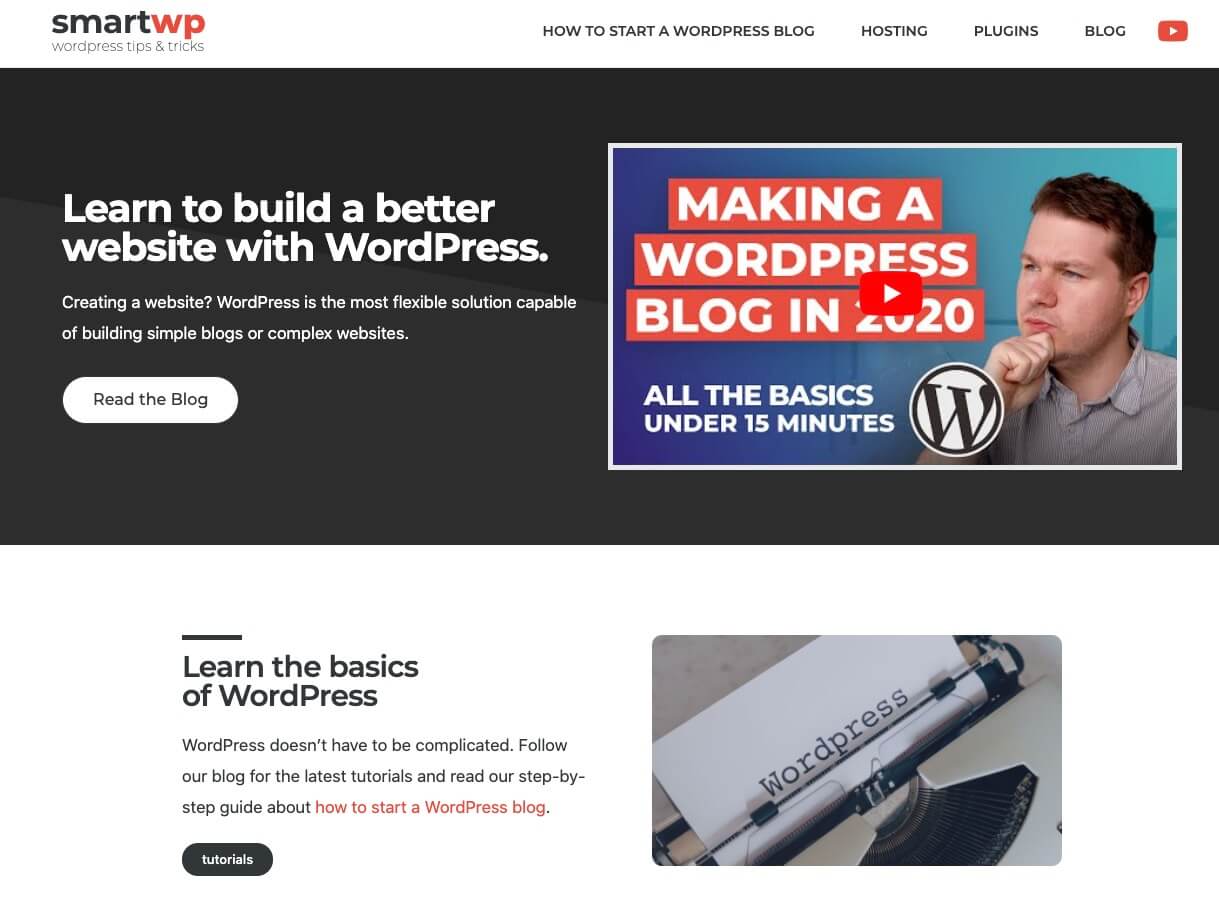
As you’re getting the gears moving on your blog, there are at least a handful of important elements you should know for basic WordPress management.
Some of the first things I often suggest new bloggers learn about include:
- Picking a hosting company
- Choosing a domain name (that works for your niche) and registering it
- Selecting the right WordPress theme
- Learn how to use WordPress plugins to customize your blog
- Writing a blog post that can capture the attention of your (future) readers
- Learning how to add images, pictures, videos, and graphics
- Publishing your first blog posts
- Check out my full library of WordPress tutorials
For more tactical tutorials on getting started with WordPress, hop over to my ultimate guide about how to start a blog.
Blogging Skills #9: Basic Knowledge of HTML
Learning some “code” is quite possibly the most scary idea for new bloggers who aren’t very tech-minded. But don’t worry, you don’t have to be a tech genius to become a successful blogger—however, a rudimentary understanding of HTML (Hypertext Markup Language), the standard language for all documents designed to be displayed in a web browser, is extremely helpful.
In essence, HTML is a way of changing plain text into something new or different. You can add headers, sub-headers, italics, bold type, colors, and more. WordPress allows you to do many things in your backend editor without ever needing to touch the code, but you can fine-tune these things to a great degree by understanding how a little bit of HTML code functions. HTML can also be used for images, graphics, and videos.
To access your HTML version of a blog post in the classic WordPress editor, select the “text” tab at the top right of your editor window. Here’s what an image would look like with the visual editor:
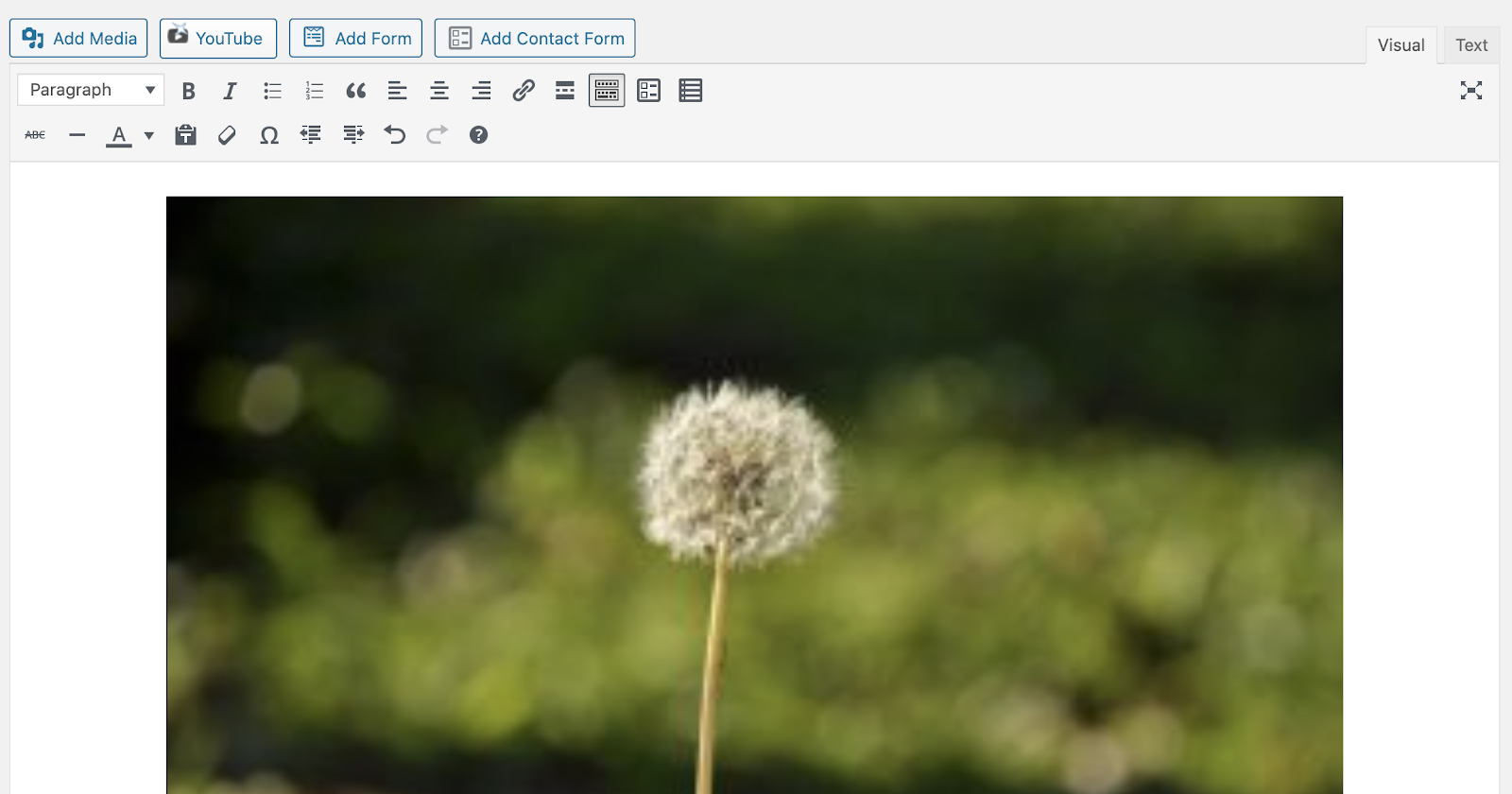
And this is what it looks like when viewing through the HTML editor:

Accessing the HTML editor version of your text can help you fix errors within the more limited (simpler) visual editor. If something doesn’t appear correctly when you preview the blog post, you may be able to fix it with some HTML tweaks—and don’t be afraid to Google search for some HTML customization snippets; you’ll be surprised at what you can do.
Examples of HTML (as a Useful Blogging Skill)
HTML can be used for several helpful things on your blog. Here are some examples of ways to use HTML:
1. Nofollow links
A nofollow link allows you to add links within your blog content without passing page authority through that link (which affects a Google ranking). For example, if you were to include a link to a resource on a competitive site, you wouldn’t want to help them rank higher in a Google search because of your link—so you’d like to make that link nofollow.
To change it to a nofollow link, go to the text editor in WordPress and find the link.
Add a rel=”nofollow” attribute tag to the link text.
For more information on how to do this, you can see my detailed guide to adding a nofollow link.
2. HTML Headings
You can also use HTML to change the heading sizes of your text. With most WordPress themes, headings range from H1 to H6.
In HTML, that looks like this:
<h5> Heading </h5>
Here’s what it might look like in the HTML editor:

Here’s what it looks like in the visual editor:

3. HTML Links (Hyperlinks)
HTML links always start with an <a> tag. It’s then followed by the href attribute, which I explain in greater depth in my guide to adding links in WordPress.
A complete line of code with a link would look like this:
<a href="https://www.ryrob.com">Ryan Robinson, Blogger</a>
This is what it looks like in HTML:

Here’s what it looks like visually:

This is just a small taste of what you can do with HTML as you add this to your blogging skills. Learning the inner workings of your blog can seem extremely overwhelming at first, but it can actually become quite fun.
Having a basic understanding of how HTML code functions can help you problem solve minor issues with your blog and be more knowledgeable about your business. Check out more of my technical tutorials here.
Blogging Skills #10: Understanding SEO
SEO (search engine optimization) is a term you’ll hear repeatedly as a blogger. I wrote an entire guide to blog SEO strategies and best practices if you want to dig deeper and fold this into your stable blogging skills—but we’ll go over the basics here.
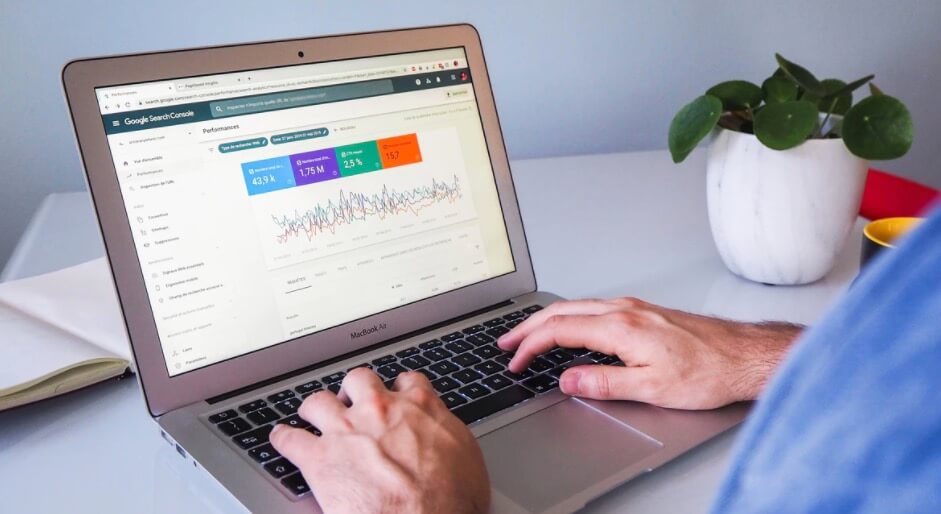
Understanding even the basics of SEO will put you miles ahead of the game when it comes to blogging. You’ll be able to start immediately working towards sending organic traffic to your blog (as long as it slowly begins to rank well in search engine results).
Use My Free Keyword Research Tool

Try my free AI-Powered Keyword Tool to get dozens of research-backed ideas for keywords & topics to write about on your blog today.
To get your content ranking on the first page of a Google search results, here are a few fundamental things you’ll need to do:
- Do keyword research: You use keyword research to find out what people are really searching for rather than going with your own best guess. Keyword research helps you choose the right words or phrases to use in your blog post title, headers, and throughout the body. Use my free blog title generator tool to get tons of ideas. It can even inform you on how to shape the outline of your blog post to make sure you’re solving your reader’s challenges in the best possible way. Look for keywords with low competition but medium to high search results, as you’re just starting. These will be the easiest to rank for and start building up some momentum.
- Understand user intent: Consider what people search for when they type a phrase, question, or keyword into a Google search. If your blog post doesn’t deliver the content they want to read (and deliver the solution they want to find), it’ll hurt your ranking abilities. Try to address your reader’s challenges as best as possible because this is the key metric search engines like Google are trying to optimize for. Be sure to create a Google Alert for any relevant topics you want to keep a close eye on in your niche, too.
- Write a great headline: A well-written blog headline can attract readers, help you rank higher in search results, and even encourage higher clickthrough rates on your article than your competitors’ search results. Plus, your headline is an opportunity to tell the story of what your blog post will help readers accomplish.
- Use the correct heading tags: Properly use the heading sizes available in your WordPress editor. Heading 1 (also known as an H1) should only be used once and is reserved for your title up top. Use heading 2 for your highest-level main topic points, and headings 3-6 should be utilized for subheaders to break up ideas throughout the rest of your content. Using the right headers can help Google identify what your blog post is about and send the right readers to your blog.
- Choose smart URL slugs: Your URL (or URL slug) is the portion of a particular blog post’s permalink that’s unique for that post (see the screenshot below). Your URL slug is the part of your permalink after your domain extension. So, for example, with the URL “ryrob.com/blog-seo,” the bold part is the slug. Your main keywords should be included in the slug, but you don’t need to include unnecessary filler words. You can see what I mean with this example right here:

I have “make-money-blogging” as my URL slug, but removed the extra words like “how” and “ to” because they’re not my exact target keywords—and longer URLs can sometimes be frowned upon.
- Use links to help boost your SEO rankings: From an on-page SEO perspective, internal links (links you add within your blog posts that encourage readers to click through and read other blog posts across your site) are a crucial signal to send to search engines like Google—telling them that a particular article is somehow related to the one at hand, and boosting the visibility of more content. External links from authoritative websites, ideally in the form of guest blog posts or earned mentions as a result of creating standout content, will also be incredibly helpful in boosting your credibility.
- Write SEO-rich meta descriptions: A meta description is a short blurb that shows up as a description below your title in a Google search result. If you use the Yoast SEO WordPress plugin, you can easily add a meta description to your blog posts. This is what it looks like in my editor:

This is what your meta description (and meta title) will look like as a Google search result:

To make your meta description more SEO-friendly, be sure to write an enticing teaser that’ll capture the attention of readers while still including one or two relevant keyword phrases.
- Optimize your images: Believe it or not, optimizing the images on your blog can actually be very meaningful in the grand scheme of your overall SEO strategy. Google doesn’t automatically know what your images are, so you have to help by adding some image alt text (a description of the image) to make it more easily identified. You can add alt text and a title for each image to let Google know what’s in the image. This is what that looks like in the WordPress editor as you add an image to your post:

Now, unfortunately, these SEO best practices only scratch the surface of everything you’ll eventually want to learn to add SEO to your arsenal of blogging skills truly—but these are the basics you’ll want to work on incorporating throughout the content on your blog as early on as possible.
If you do this well, you should see your content begin to perform well in organic search results within a few months of starting.
Blogging Skills #11: Finding and Learning From Your Audience
Another useful skill in blogging is finding your target audience, understanding them, and learning from them. Without knowing who your target audience really is, it can be very difficult to market your blog content properly, let alone learn enough to eventually monetize your blog with them.

Here are some simple ways to start locating and developing an understanding of your audience:
- Learn more about your niche: If you’re already interested and experienced, you’re far more likely to jive with (and understand) other people who are interested in the same things.
- Hang out with people interested in your niche: Find other people (in-person or online) who like what you’re blogging about. Ask them what topics they want to learn about and what challenges they face.
- Research your niche: Regardless of how much you know today, dedicate regular time to researching more within your niche. The more you research your niche, the more you’ll discover new topics that people are searching for answers on, the topics your audience wants to read more about, which products they use, and what content is already available out there (so that you can create more impactful content).
- Check out social media: The proper social channels can be very powerful in helping you better understand your audience and their interests. An excellent way to find your audience is to join Facebook groups in your niche, follow related hashtags on Twitter or Instagram, and see what you can learn from browsing through the followers of top influencers already in your space.
- Browse discussion forums: Find discussion forums in your niche and observe the chatter to see what people are talking about and the topics they’re discussing.
- Visit the competition: Find out what your competition is delivering. Read the comments section of their most popular articles to see what people think of it and identify questions you could answer more effectively on your blog.
- Watch videos and listen to podcasts: Videos (on YouTube) and podcasts from industry leaders are another great way to stay current on the most important topics in your niche, identify other potential creators you can eventually partner with, and see the content that your audience is craving more of. Plus, you might be able to (soon) pitch yourself as a guest to go on some of the podcasts or YouTube channels within your niche.
This blogging skill is a non-negotiable, because without the capacity to really connect meaningfully with your audience (or future readers), you’ll struggle to ever build a real business around your blog.
Blogging Skills #12: Researching

Write what you know. You’ve probably heard this phrase before, right? I’ll be the first to agree that successful bloggers pull from their experiences to deliver impactful content. Still, I can’t stress enough how important great research is for bloggers to create more well-rounded, accessible, and genuinely comprehensive content.
Even if you’re an expert in your field, you won’t grow as a blogger without continuing to learn. Deep research is an effective way to understand a topic far more profound than just the surface level—and share solutions that give your reader much greater value. If researching isn’t one of the blogging skills you’ve mastered yet, here are a few tips to get you started:
1. Check Your Facts
One thing about the Internet is that not everything you read is necessarily true. Sometimes, an insight from an article you just read may have been true at one point in time… but isn’t anymore. That’s why I practice checking, double-checking, and triple-checking any key facts or statistics (like my blogging statistics) I share.
On the Internet, people share shocking facts to get more clicks on their articles. Some quickly consider these ideas truth, even if they aren’t accurate.
For example, Insider recently published an article, 10 “Facts” Everyone Believes But Aren’t Really True, which includes some pretty commonly repeated “facts” that aren’t in fact true…

The article discusses how most people believe things like cracking your knuckles will lead to arthritis or that if you swallow gum, it’ll stay in your body for seven years. These things aren’t true, but people believe them anyway, often because they’re told about them by friends or family who repeat the false information from others they’ve known.
While correcting every fact (things often change quickly) is impossible, digging deeper into your research is worth the extra effort. If you’re sharing statistics from 2003, it may be time for an update.
2. Know Where to Find Answers
The information is out there; you must know where to look. Here are some of the best places to start when doing research for your blog content:
- Read the experts online: Find authority websites that cover topics you’re writing about, too. Keep up on trends and news and learn from people closely looking at the subjects you’re writing about.
- Listen to podcasts: Podcasts are top-rated today, and people with deep expertise create them about very niche topics.
- Head over to YouTube: Sometimes, when I’m writing about a difficult topic or if I want to learn about something while eating breakfast, I’ll pull up a YouTube video about it in the background.
- Subscribe to magazines and email lists: Magazines might seem outdated, but they’re some of the most concentrated sources of real writers who are writing deeply about current topics. If you want to stay digital, you can opt to sign up to receive relevant emails from both magazine publishers and from trusted bloggers in your space.
- Go to the library (or Amazon): Books are excellent resources for doing additional research. They help reference and flesh out ideas that expand far beyond what you can uncover from an individual blog post. I’ve compiled a list of the best books for bloggers and the best blogging courses so you can find impactful books & courses within your niche.
- Talk to experts: You can also do research by interviewing people in your field. People with much experience on a subject can be invaluable to you and your blog audience. While effective blogger outreach is one of the most coveted blogging skills in its own right, if you can connect with an expert authentically, they’ll often be willing to share an insight that can add to your content’s authority.
There’s no real limit to the places where you can find useful answers (both online and offline). Still, it’s important also to maintain a healthy level of skepticism—you should never believe everything you read on the Internet.
3. Keep Track of Your Research
One final important aspect of doing effective research is keeping useful notes that can actually strengthen your content. Therefore, when I start writing something new for my blog here, I always start with a solid outline to ensure I cover everything about the subject matter that my audience will (likely) crave answers on.
As you research for your blog posts, you should add links to your outline (to reference for additional reading and to come back to yourself). Adding links will save you much time when you dig into the writing process later. You can also copy and paste important ideas or quotes you know you’ll want to include when it comes time to write your blog post; just be sure to cite the sources for any material you pull directly from.
Blogging Skills #13: Financial Management

Most bloggers aren’t accountants or finance professionals, but if you’re running your blog with a business plan, there will be financial aspects you can’t afford to neglect. While these kinds of blogging skills can take time to develop (and form new habits), the bottom line is that you want to bring in more money than you’re sending out—and you’ll also want to be organized & thoughtful about what you do with your money.
Here are a few ways that you can manage the financial aspects of your blog and create winning money habits:
Understand Your Expenses
The first step in mastering your blogging finances is understanding your expenses. While starting a blog should be fairly inexpensive, you’ll naturally begin to accrue more costs as your blog grows, and you will need to invest more. Some basic blogging costs that you’ll need to account for early on in your blogging business include:
- A computer
- A reliable Internet connection
- A domain name
- A great hosting plan (or monthly hosting plan if you’re on a budget)
These essentials will allow you to get started, but as your needs grow—so will your expenses. Some things you may need to invest in as your blog grows could be:
- SEO tools (and other blogging tools) like Ahrefs
- Premium analytics tools to learn more about your readers
- Blog security plugins and services
- Advertising costs
- A premium WordPress theme
- Additional plugins to extend functionality on your blog
- Email marketing tools (like ConvertKit vs. AWeber vs. Mailchimp)
- Additional hardware costs like microphones or headphones
- Office supplies
For a much deeper look into potential expenses, check out my guide “How much does it cost to blog?” where I break down the costs for hobby bloggers up to full-time bloggers so you can get a better idea of how your expenses might change depending on the size of your blog over time.
Keep Reliable Financial Records
The next step to responsible financial management is keeping reliable records of your incoming revenue and outgoing expenses. You can see how I categorize these line items in my own monthly blog income reports. Here’s an example from one of my recent monthly blog income reports, broken down by income source:
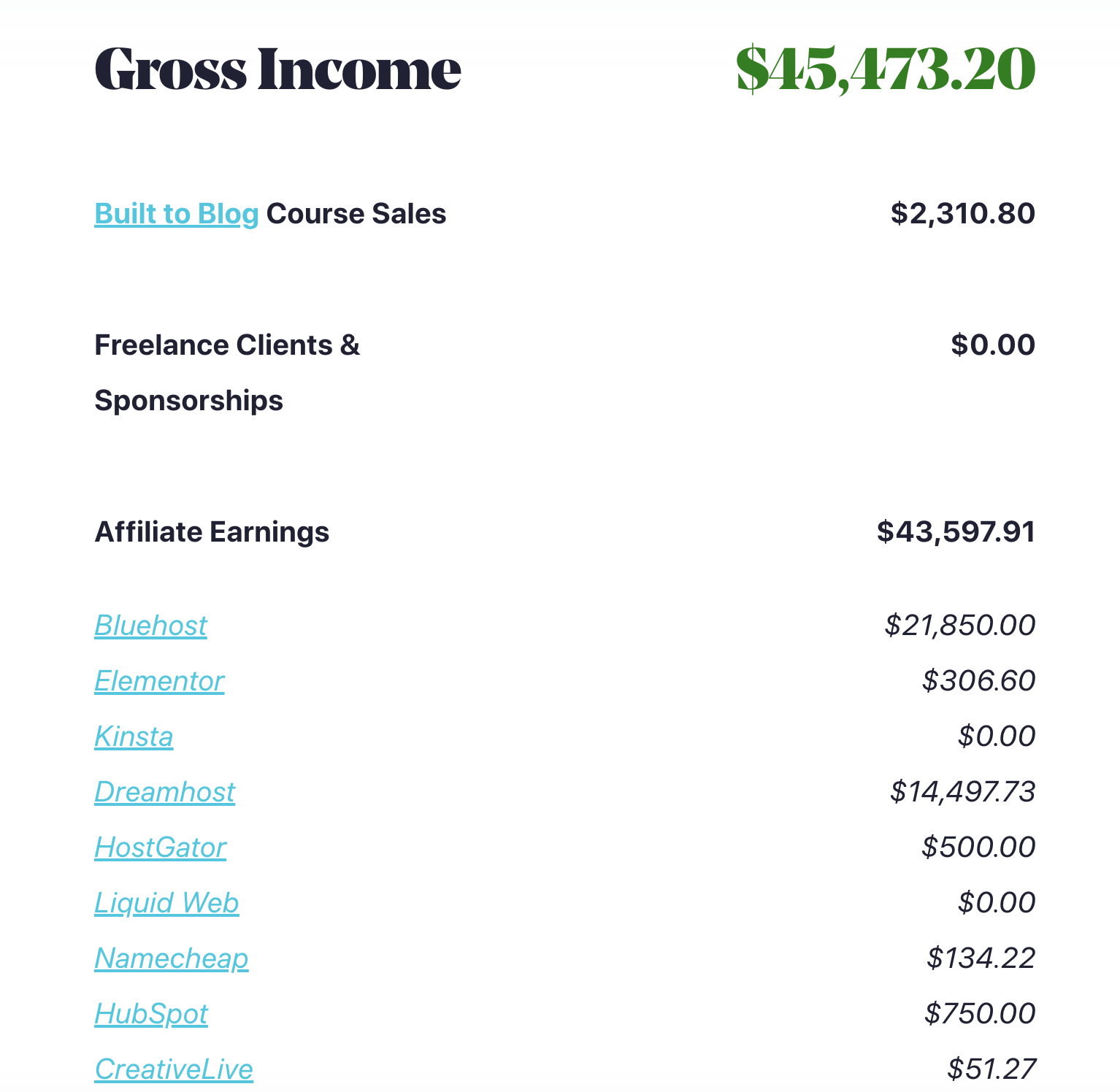
On the flip side, here’s a snapshot of my expenses broken down in detail, too:
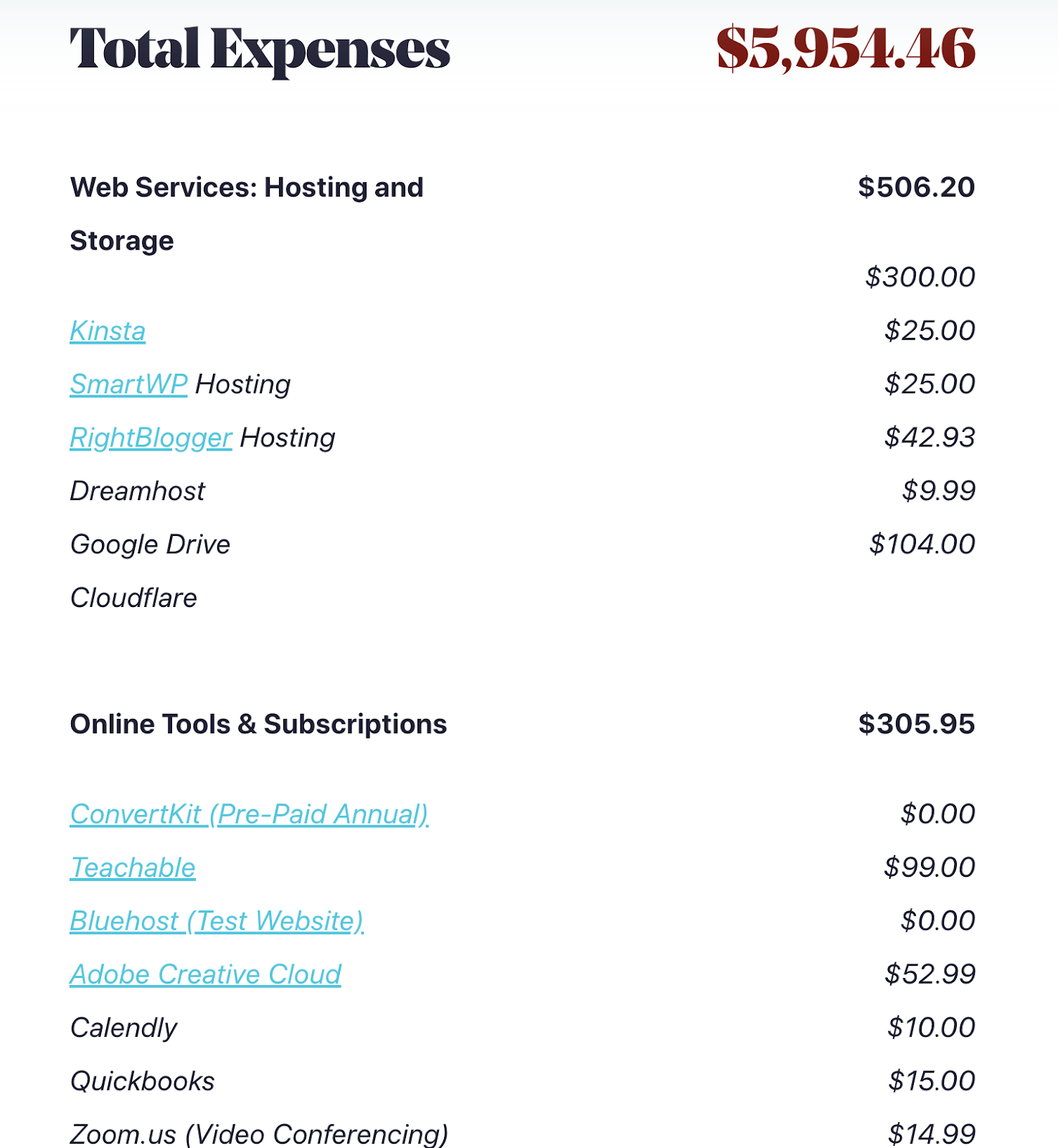
While my blog income reports have become one of the most popular regular pieces of content I publish, they’re as much an activity for reinforcing my own responsible financial management. Having this as a routine keeps me disciplined in regularly analyzing the financial health of my business, which is one of the blogging skills I’m most proud of building (from scratch) over the years.
Find Multiple Sources of Income
As you grow your blog, it’s essential to diversify your income sources. You might begin with Google Ads and Amazon’s affiliate program, but as time goes on, you can add other better-paying affiliate programs and partnerships to your lineup.
You can even find niche products related to your blog or ads that your visitors would appreciate. You may even want to start selling your own products through an eCommerce store attached to your blog.
Keep a living document that includes all of your sources of income, so you can see how well they’re performing each month. Documenting all of this will also help when it comes to paying your taxes.
Be Ready to Pay Your Blog Taxes
Yes, paying blog taxes can frustrate many bloggers and online creators, but it mustn’t be a nightmare. With organization and simple bookkeeping, paying taxes correctly (while maximizing your deductions under local tax laws) isn’t too difficult.
If your blogging business reaches a sizable point, it may be worth hiring an accountant. But even early on, I recommend using an easy tool like Quickbooks Self-Employed to help you with your taxes.
Blogging Skills #14: Understanding Analytics
As a blogger, you’re (hopefully) regularly checking to see what’s working and what isn’t. Analytics are a great way to see how well your website, social media channels, and email campaigns perform.
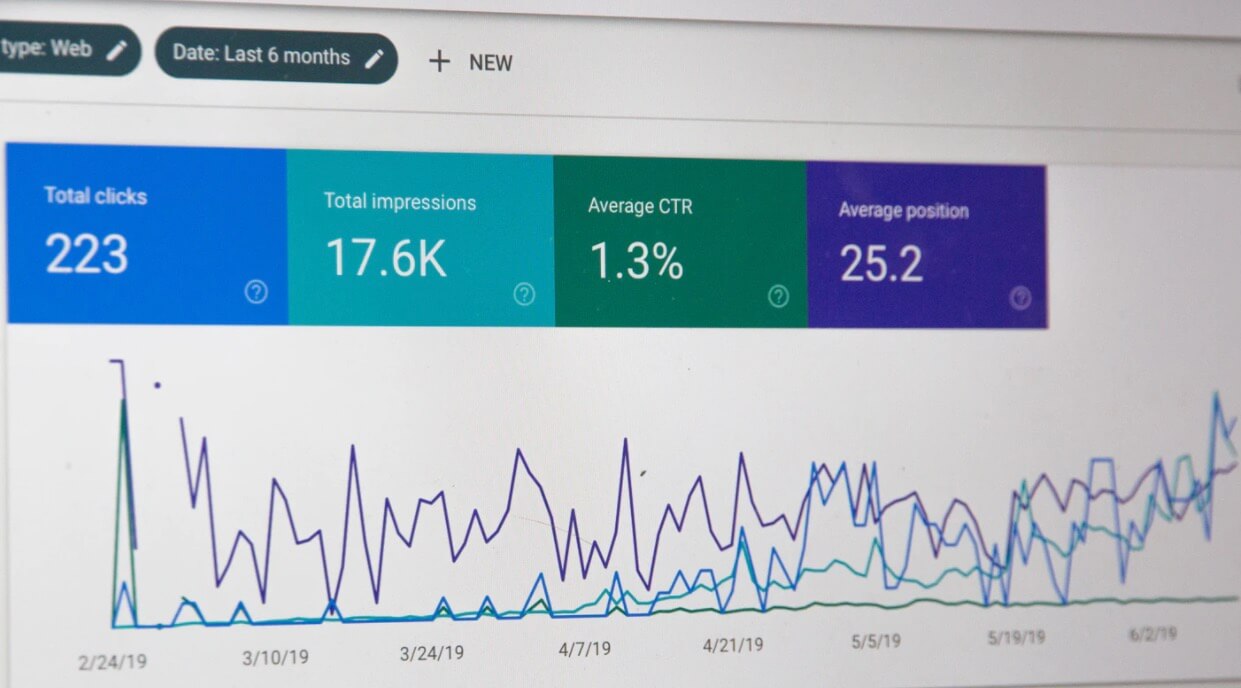
When you first set up your Google Analytics (or a privacy-oriented analytics solution like Fathom), the information can sometimes appear to be confusing. I’ll explain some of the analytics terms here so you can understand them the next time you log in to work on making this one of your blogging skills—and try to pull out some actionable insights:
- Realtime: Realtime shows you when (and where) people are on your blog. You can see where they’re from, what page they’re on, and what traffic source they used to get to your blog.
- Audience: The audience tells you the number of users, new users, sessions, bounce rate, and several other important details about the people visiting your blog. You can adjust it to tell you the stats for a day or a section. You can also compare periods with other periods to see if your traffic is improving. For example, you may want to compare the months of March 2024 to March 2023.
- Acquisition: Acquisition tells you where people are coming from to reach your blog. You can see if they’re coming through organic traffic, direct, social media, or referral. Acquisition is a very telling section because you can see what type of marketing works best for your blog. If you’re seeing a lot of social referrals, then you know your social media campaigns are doing well.
- Behavior: Behavior tells you which pages people have visited, page views, unique page views, average time on page, bounce rate, and more. This analysis is helpful to see if people are visiting more than one page on your blog. You can instantly see which pages are getting the most traffic.
- Bounce rate: A bounce rate refers to the number of pages a person visits when they visit your blog. If you see a 100% bounce rate, they visited one page before exiting your blog. An excellent bounce rate is between 26-40%, and an average bounce rate is 41-70%. This number will vary, but you should see your bounce rate drop as you create more relevant content with internal links.
Other Tools to Help with Website Analytics
Several other tools you can use to help analyze and take action on your blog’s analytics. Some I use and recommend include:
- Tableau: A different analytics tool that makes it easier to interpret & understand your data
- Google Search Console: Another tool from Google that allows you to monitor your keyword positions and identify any technical errors on your site
- Sprout Social: An analytics tool that allows you to quickly monitor your social media analytics and make informed decisions about the content you share
While there’s a seemingly limitless number of useful analytics-related tools out there for bloggers to choose from, the most important thing to keep in mind is that you should strive to continually learn from your audience—to make better-informed decisions about what to publish and how you can better serve your readers in the future. Learn how to do that repeatedly, and you’ve mastered one of the most important blogging skills.
Blogging Skills #15: Flexibility
One of the remaining top blogging skills you’ll need to invest in building this year is flexibility, not in the context of touching your toes, but rather a flexible mindset.

You might have a detailed business plan for your blog that doesn’t pan out, or it may be that certain parts of your plan are underperforming and need to be tweaked in response to real-world observations.
The Internet is a fast-paced environment, and what works now may not work the same in a few months or years from now. Be willing to change, adapt, and learn from what’s changing. Here are a few ways to become more flexible within your blogging business:
- Try out A/B testing: Like it or not, sometimes it takes testing several ideas to see which plan or strategy is most effective. For example, if you publish a pin to Pinterest, share several more over the next few days with different background images, text treatments, and colors to see which ones people respond to the most.
- Be honest: Suppose that a year ago, you used to get a ton of traffic from a specific social media outlet. A year later, you’re only getting in a trickle of visitors. Be honest with yourself, saying that something needs to change. You either need a new outlet, learn what has changed, and update your strategy to match the changing environment.
- Keep up with your analytics: We’ve already said that understanding your analytics will help you tremendously as a blogger. But, if you send out an email to your subscribers and no one clicks through, you probably need to change approaches the next time, for example.
- Stay on top of trends: Quickly notice when something big happens in your niche. If you’re one of the first people to write about a new topic, you’ll be able to glean a lot of traffic from moving quickly.
Another major benefit of adopting a flexible attitude with your blogging efforts is that you won’t lock yourself into doing things only a certain way. The reality of blogging is that everything is constantly changing and evolving, so the nature of the business requires your ability (and excitement) to adapt. That’s why flexibility is one of the most essential blogging skills to build upon daily.
Blogging Skills #16: Humility
The last blogging skill on my top list here is humility. It might seem odd that so many character-driven blogging skills are on this list, but these qualities are essential to enhancing any other skills you may have (or work to develop). Technical skills can arguably be learned a lot easier than changing things about your mindset, habits, or character—but the latter will be much more impactful in helping to grow your blog business over time.

When you produce something and put it out on the Internet, most people will have opinions. You know what I mean if you’ve read the comments section of a somewhat controversial Facebook post or news article. People can even be downright rude or antagonistic online.
And yes, you need a certain amount of self-confidence to push past internalizing the negativity, but you also need humility. Humility keeps you from being crushed when someone leaves you a negative review or questions your authority. Though sometimes comments are just intentionally mean, there are other times when someone offers constructive feedback that may help you improve your delivery.
That’s another massive benefit of adding humility to your roster of blogging skills because when you’re humble, you can give yourself permission to learn from other people (and not be naive enough to believe you’re the sole source of expertise on a subject). You shouldn’t reach a point in your career where you can no longer learn from other knowledgeable people in your space. I promise it won’t hurt your reputation if you’re willing to learn from your readers or other experts in your niche.
I’ve been blogging for the better part of a decade now, and I still regularly listen to blogging advice, absorb new information, and make decisions based on insights from other experts in my field.
What are Your Most Underrated Blogging Skills?

I’m turning this conversation about blogging skills over to you now. Did I miss any big ones that should be prioritized this year?
What do you think are the most important blogging skills we should be working on? Which skills have benefited you the most as a blogger so far?
I’d love to hear your take in the comments below!
Ready to Start Your Blog (the Right Way)?
Check out my ultimate guide How to Start a Blog (on the Side) Today.

39 replies to “16 Blogging Skills You’ll Need to Build (and Strengthen) in 2024: Top Skills for Bloggers”
Love the positivity in this! It’s so encouraging to hear that everyone comes to blogging with some strengths, and even better that the rest can be learned with the right focus. This really motivates aspiring bloggers to keep growing and honing their skills. Great advice!